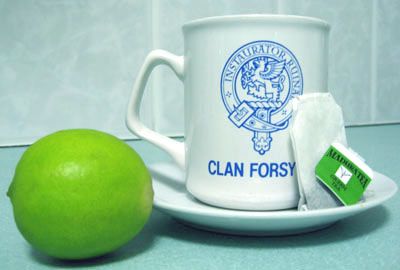 Green Tea contains all sorts of good things, like ... green. And tea.
Green Tea contains all sorts of good things, like ... green. And tea.Well apparently there is bunch of catechin polyphenols, notably epigallocatechin gallate (EGCG) which is a powerful anti-oxidant that can prevent / cure / who knows what for:
* Cancer
* Alzheimers
* Rheumatoid arthritis
* High cholesterol
* Cardiovascular disease
* Impaired immune function
The FDA of the USA hasn't done any research to confirm any of this. However an article published in the American Journal of Clinical Nutrition (Vol 83, pp 355-361) stated that drinking more than 2 cups of green tea a day prevented cognitive impairment in the elderly. So if you don't want to go crazy when you're old then drink lots of green tea. However, don't drink it if you're pregnant. A study published with the same journal (Vol 136, pp 1043-1047) showed that rats had improved reference and working memory-related learning abilities. So green tea is also good for rats.
Green, oolong, and black teas are made from the leaves of the Camellia sinensis plant. Steam the leaves and you get green tea, ferment the leaves and you get black / oolong. The fermentation process apparently depletes the catechins, which is bad. Black is bad, green is good.
When I was in China, everyone was drinking green tea. This wasn't the sort of green tea that I was used to in Australia, although the taste was similar. The Chinese (at least in Jiangxi where I was staying at the time) dump this stuff that looks akin to a bunch of finger length stems of grass leaves into a huge cup of steaming hot water and then begin to sip. This was quite strange to me because they were basically drinking hot water. I would grab some chop sticks and begin dunking and swirling the tea about, trying to get the flavour through the water ... and make the grass sink to the bottom. There was a lot of spitting out or chewing and eating of the grass by my Chinese compatriots. After some minutes of stirring and prodding I would have sunk all the grass and have the brew a nice green-yellow shade. It tasted quite nice.
Liptons make some excellent iced tea, and the green tea is reasonably good, but check out how much sugar they put into that thing.
In the Philippines I consumed a large amount of calamansi, which is like (but NOT actually) a kumquat with a hint of lime flavour. And I love it! Nothing better than hot calamansi juice (plus water & sugar) for a sore throat. Liptons was kind enough to produce Honeymansi iced tea, which is tea with calamansi and honey and quite delicious. My partner's mother grows her own calamansi tree and I have been lucky enough to obtain some of the fruits. I have found that green tea, juice from one calamansi and a touch of sugar or drop of honey is an absolutely awesome drink.
Unfortunately, calamansi is not easy to come by, so substituting the juice from quarter of a lime is also quite nice. I don't know if the calamansi/lime juice destroys the catechin goodness of the tea, but hot damn if that aint a nice refreshing drink.
Perfect for sitting in front of the computer all day.
Coffee
Coffee used to make me ill because of an unfortunate association with sea sickness. I have not had coffee since I was very very young. Due to an ordering mistake and dire thirstiness, I had some coffee recently and found that I was not totally repulsed by this beverage anymore. I found that I was more awake. However, after some very limited experimentation with a sample size of 1, I also found that I was less focused, more skitish and possibly depressed somewhat afterwards. Enough effects that I decided I would continue to avoid consuming coffee in the future.
Chai
My Aunt introduced me to Chai a number of years ago. Chai is an awesome blend of tea, milk, spices (cinnamon, nutmeg, vanilla, cloves) and love. Refreshing and goes exceedingly well with toasted fruit bread. I had never heard of it before, but recently I see the stuff available in most coffee shops. Can't keep a nice beverage down. I encourage everyone to try Chai, but don't expect tea or coffee type flavour - it is really different.


No comments:
Post a Comment